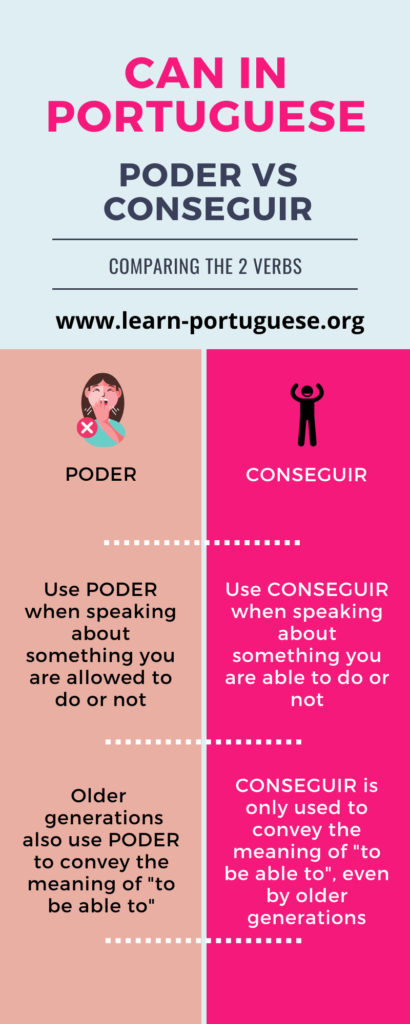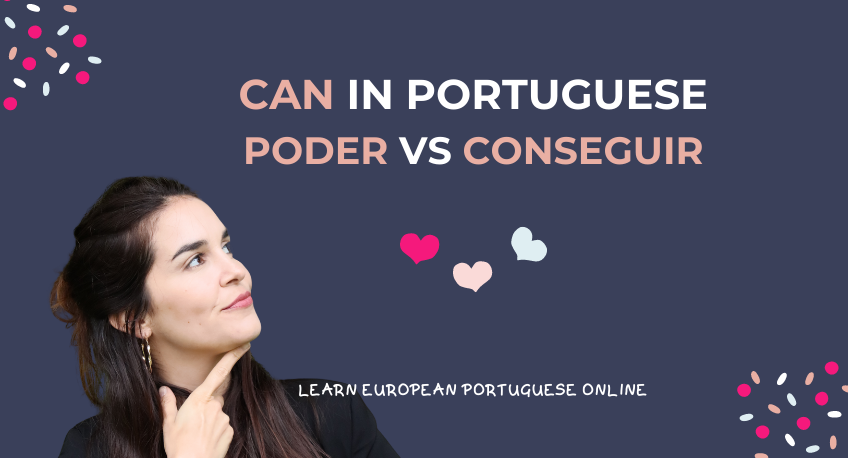If you’ve been following my previous posts, you know I have been tackling some of the pairs of verbs that are most confusing for English speakers. Today is no exception, and I will tell you about the difference between the verbs poder and conseguir.
The difference between poder and conseguir
Both these verbs – poder and conseguir – can be translated in some contexts as to can.
However, they can’t be used interchangeably, as they actually convey different meanings.
Take a look at the following sentences:
- Eu não posso comer mais – I can’t eat more
- Eu não consigo comer mais – I can’t eat more
As you see, we could translate both these sentences the same way. However, in Portuguese they mean two different things, and I would like to clarify it for you, when to use poder and when to use conseguir.
You can also watch me speaking about this topic on YouTube:
The verb poder in Portuguese
First things first. Let’s take a look at the conjugation of the verb poder in the Present Tense:
Eu posso
Tu podes
Você/ Ele/ Ela pode
Nós podemos
Vocês podem
Eles/ Elas podem
As you can see, this verb is quite irregular in the first person singular form. You can find more about it here. You can also use the website infopedia.pt to check how to conjugate this verb in other tenses.
Also, if you want to look at more irregular verbs and dive deep into the world of grammar in a fun, engaging way, check out my European Portuguese Master Course.
The use of poder in Portuguese
But now, when do we use the verb poder in Portuguese?
Take a look at this sentence again:
Eu não posso comer mais – I can’t eat more
In fact, in here we are saying that we are not allowed to eat more. Imagine this cenario:
A five-year old boy has eaten a lot of cake and his mother tells him he can’t eat more – he is not allowed to eat more.
In this case, in Portuguese we would use the verb poder and not the verb conseguir.
So, in a nutshell, we use the verb poder when we want to speak about things that we are allowed to do or not.
Other examples include:
Não pode comer no autocarro – You can’t eat in the bus / You are not allowed to eat in the bus
Não posso sair convosco – I can’t go out with you/ I am not allowed to go out with you
Get the picture? 🙂

The verb conseguir in Portuguese
Moving on to the verb conseguir, here is its conjugation:
Eu consigo
Tu consegues
Você/ Ele/ Ela consegue
Nós conseguimos
Vocês conseguem
Eles/ Elas conseguem
Once again, take a look at the first person singular – it is somehow irregular. Don’t forget you can check this and other tenses in infopedia.pt
The use of the verb conseguir in Portuguese
Unlike the verb poder, the verb conseguir is used in the same kind of sentence, but with a different meaning.
Let’s pick the example above again:
Eu não consigo comer mais – I can’t eat more
In this case, what we are trying to say is that we can’t eat more, because there is something physical (and sometimes psychological) that is preventing us to carry out the action.
Here we could imagine that we ate so much cake, that now we are too full and we can’t physically stand eating more cake.
So, we use the verb conseguir to speak about situations when we can’t do something because it is physically or mentally impossible. Sometimes it can also be that something external to us is preventing us from doing something.
Take a look at some other examples:
- Eu não consegui acabar o teste, porque não tive tempo. – I couldn’t/ was not able to finish the test, because I didn’t have time (external barrier – lack of time).
- Tu não consegues mesmo falar baixo, pois não? – You really can’t/ aren’t able to speak quietly, can/ are you? (physical and psychological barrier – not being able to speak softly).
Note that in the first example, we are not able to do something due to something external to us – in this case the time.
Something interesting about the verbs poder and conseguir
Before I go, I would like to call your attention for something interesting that I have recently found out.
As some of you may know, I have a 95 year-old grandma. She is a super fun lady, but this is not where I want to go.
What I want to say is that languages evolve and sometimes I catch my grandma saying something in a way that it is not the norm anymore, but that once was.
This brings me to the use of the verb poder.
While nowadays, poder is used only as to be allowed to do something, back in the days it was also used as to be able to.
So, my grandma would say:
Não posso carregar com isto – I can’t carry this (I am not able to carry this)
interchangeably with:
Não consigo carregar com isto – I can’t carry this (I am not able to carry this)
So, basically, she will use poder and conseguir both as to be able to, but she will use only poder to convey the meaning of to be allowed to.
I just want you to be aware of this, as you might come across some older (wiser!) people that might still use it like this, and I don’t want you to be even more confused.
Conclusion
So, to sum up.
- Poder is used as to be allowed to
- Conseguir is used as to be able to do something (physically or mentally)
- Sometimes conseguir can also be influenced by external factors – like time.
- Older people tend to use poder as to be able to, as well as conseguir. However, when they mean to be allowed to, they only use poder, and never conseguir

This is the end of our post. I hope you have enjoyed it and that it helped you clarifying the difference between the verbs poder and conhecer.
Please write a sentence in the comments below in Portuguese, using one (or both) of these verbs.
I hope you have fun learning Portuguese and I hope you are there, on the other side, for future posts.
Beijinhos,
Mia.


Thank you. There’s a slight error in this block. Search for “Let’s pick the example above again” and carry on reading, and you’ll see what I mean.
Thank you very much, I see what you mean and I have already corrected it!
I hope you’ve enjoyed the article, nevertheless 🙂
Beijinhos,
Mia
So how about if I ask someone “can you help me”? Should I use conseguir? But seems people use poder? A bit confused.
Olá!
Yes, I can see how that can be confusing.
However, you have to think that this “poder” here in “pode ajudar-me” (can you help me), is more a polite “poder” than you really asking if the person can actually help you, if that makes sense.
In other words, you are adding this verb, just to make the conversation more polite, or to make the request for help more polite.
So, we can say this is an exception. 🙂
You are right, if we were really asking and wanting to know if the person could help us, then it would make more sense to use “conseguir”, but this is also a bit like what we see in English. You also ask “May I help you?”, which also seems like you are asking permission to help, although that is not really the case. Does this make more sense now? I hope so 🙂
Please let me know if you need any further help.
Beijinhos,
Mia.